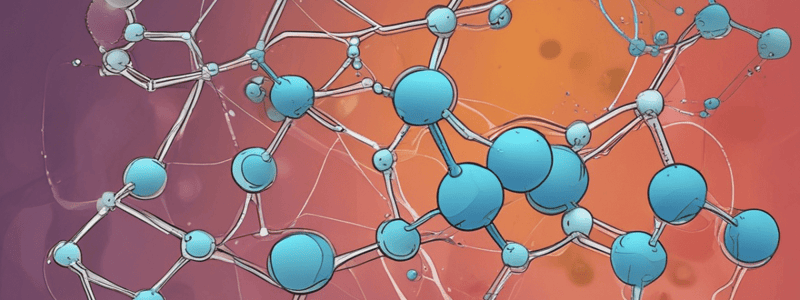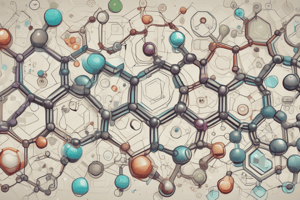Podcast
Questions and Answers
What is the characteristic of an isoxazole?
What is the characteristic of an isoxazole?
What is the IUPAC name of the compound with the molecular formula C3H3NO?
What is the IUPAC name of the compound with the molecular formula C3H3NO?
At what temperature does isoxazole boil?
At what temperature does isoxazole boil?
What is the reaction used to synthesize isoxazole?
What is the reaction used to synthesize isoxazole?
Signup and view all the answers
What is the role of furoxan in the human body?
What is the role of furoxan in the human body?
Signup and view all the answers
What is the application of isoxazole in the pharmaceutical industry?
What is the application of isoxazole in the pharmaceutical industry?
Signup and view all the answers
What is an example of a natural product that contains an isoxazole ring?
What is an example of a natural product that contains an isoxazole ring?
Signup and view all the answers
What determines the formation of pyrazole or isoxazole in 1,2-azoles preparation?
What determines the formation of pyrazole or isoxazole in 1,2-azoles preparation?
Signup and view all the answers
What is the product of the cyclization of β-keto esters with hydroxylamine?
What is the product of the cyclization of β-keto esters with hydroxylamine?
Signup and view all the answers
What is the intermediate reactant formed in the 1,3-dipolar cycloaddition reaction to produce a simple isoxazole?
What is the intermediate reactant formed in the 1,3-dipolar cycloaddition reaction to produce a simple isoxazole?
Signup and view all the answers
What is the molar mass of isothiazole?
What is the molar mass of isothiazole?
Signup and view all the answers
What is the characteristic of the ring structure of isothiazole?
What is the characteristic of the ring structure of isothiazole?
Signup and view all the answers
What is the class of compounds that isothiazole is a member of?
What is the class of compounds that isothiazole is a member of?
Signup and view all the answers
What is the characteristic of the position of the two heteroatoms in isothiazole?
What is the characteristic of the position of the two heteroatoms in isothiazole?
Signup and view all the answers
What is the reactant used with propiolaldehyde to prepare isothiazole?
What is the reactant used with propiolaldehyde to prepare isothiazole?
Signup and view all the answers
What is the position of the main substitution in 1,2 azole?
What is the position of the main substitution in 1,2 azole?
Signup and view all the answers
What is the result of halogenation of pyrazole?
What is the result of halogenation of pyrazole?
Signup and view all the answers
Why is the reaction of 1,2 azole different from that of furan, pyrrole, and thiophene?
Why is the reaction of 1,2 azole different from that of furan, pyrrole, and thiophene?
Signup and view all the answers
What is the characteristic of the reactivity of isoxazole and isothiazole?
What is the characteristic of the reactivity of isoxazole and isothiazole?
Signup and view all the answers
What is the condition required for the halogenation of isoxazole or isothiazole?
What is the condition required for the halogenation of isoxazole or isothiazole?
Signup and view all the answers
What is the product of the cyclo-condensation of β-chloro-α,β-unsaturated aldehydes with ammonium thiocyanate?
What is the product of the cyclo-condensation of β-chloro-α,β-unsaturated aldehydes with ammonium thiocyanate?
Signup and view all the answers
What is the product of the reaction of pyrazole with acetyl nitrate?
What is the product of the reaction of pyrazole with acetyl nitrate?
Signup and view all the answers
What is the position of nitration in 3-methylisoxazole?
What is the position of nitration in 3-methylisoxazole?
Signup and view all the answers
Which type of pyrazoles can be C-acylated directly?
Which type of pyrazoles can be C-acylated directly?
Signup and view all the answers
What is the product of the Vilsmeier formylation of pyrazole?
What is the product of the Vilsmeier formylation of pyrazole?
Signup and view all the answers
What is the temperature required for the metallation of N-sulfonyl 4-bromopyrazoles?
What is the temperature required for the metallation of N-sulfonyl 4-bromopyrazoles?
Signup and view all the answers
What is the position of lithiation in N-sulfonyl 4-bromopyrazoles?
What is the position of lithiation in N-sulfonyl 4-bromopyrazoles?
Signup and view all the answers
What is the reaction that occurs during the metallation of 4-Bromopyrazoles by Metal-Halogen Exchange?
What is the reaction that occurs during the metallation of 4-Bromopyrazoles by Metal-Halogen Exchange?
Signup and view all the answers
What is the significance of 1,2-Azoles in natural products and pharmaceutical drugs?
What is the significance of 1,2-Azoles in natural products and pharmaceutical drugs?
Signup and view all the answers
What is the difference between the nitration of pyrazoles and isothiazoles, compared to isoxazoles?
What is the difference between the nitration of pyrazoles and isothiazoles, compared to isoxazoles?
Signup and view all the answers
Which of the following isoxazoles is sufficiently reactive to undergo nitration at the 4-position?
Which of the following isoxazoles is sufficiently reactive to undergo nitration at the 4-position?
Signup and view all the answers
What is the major difference between the nitration of pyrazoles and isothiazoles, compared to isoxazoles?
What is the major difference between the nitration of pyrazoles and isothiazoles, compared to isoxazoles?
Signup and view all the answers
What is the product of the reaction of pyrazole with acetyl nitrate?
What is the product of the reaction of pyrazole with acetyl nitrate?
Signup and view all the answers
What is the significance of the low temperature in the metallation of N-sulfonyl 4-bromopyrazoles?
What is the significance of the low temperature in the metallation of N-sulfonyl 4-bromopyrazoles?
Signup and view all the answers
What is the characteristic of the reactivity of pyrazoles and isothiazoles?
What is the characteristic of the reactivity of pyrazoles and isothiazoles?
Signup and view all the answers
What is the product of the Vilsmeier formylation of pyrazole?
What is the product of the Vilsmeier formylation of pyrazole?
Signup and view all the answers
Which type of pyrazoles can be directly C-acylated?
Which type of pyrazoles can be directly C-acylated?
Signup and view all the answers
What is the position of nitration in the reaction of pyrazole with acetyl nitrate?
What is the position of nitration in the reaction of pyrazole with acetyl nitrate?
Signup and view all the answers
What is the role of acid in the rearrangement of nitropyrazole?
What is the role of acid in the rearrangement of nitropyrazole?
Signup and view all the answers
What is the significance of 1,2-Azoles in natural products and pharmaceutical drugs?
What is the significance of 1,2-Azoles in natural products and pharmaceutical drugs?
Signup and view all the answers
Study Notes
Isoxazole and Isothiazole
- Isoxazole is an azole with an oxygen atom next to the nitrogen.
- Isoxazole rings are found in some natural products, such as ibotenic acid.
- Isoxazoles also form the basis for a number of drugs, including the COX-2 inhibitor valdecoxib (Bextra).
- Furoxan is a nitric oxide donor.
Isoxazole Properties
- Molecular formula: C3H3NO
- Boiling point: 95 °C
Synthesis of Isoxazole
- Reaction of 1,3-dicarbonyl compounds with hydroxylamine under mild acidic conditions.
- 1,2-azoles preparation depending on the reagent used.
- Cyclization of β-keto esters with hydroxylamine to provide 3-hydroxy- isoxazoles.
- 1,3-Dipolar Cycloaddition Formation of a Simple Isoxazole.
Isothiazole
- IUPAC name: Isothiazole
- Other names: 1,2-thiazole
- Properties: Molecular formula: C3H3NS, Molar mass: 85.13 g/mol, Boiling point: 114 °C
- An isothiazole is a type of organic compound containing a five-membered aromatic ring that consists of three carbon atoms, one nitrogen atom, and one sulfur atom.
Isothiazole Synthesis
- Isothiazole can be prepared from thioamides in the following way:
- By reaction propiolaldehyde with sod.thiosulfate in the presence of ammonia solution.
- By cyclo-condesation of β-chloro-α,β-unsaturated aldehydes with ammonium thiocyanate will give 4,5- disubstituted isothiazoles.
Reaction of 1,2 Azole
- Like 1,3 azole, due to the presence of =N- group in the ring, the 1,2 azole are much less reactive towards ES reactions than furan, pyrrole and thiophene.
- 1,2 azole undergo ES reactions under an appropriate reaction condition.
- The main substitution takes place at the C-4 position.
- Pyrazole reactivity like phenol, but isoxazole & isothiazole reactivity like benzene.
Halogenation of Isoxazoles, Pyrazoles and Isothiazoles
- Halogenation (iodination, bromination) of pyrazole leads to the 4-halopyrazole.
- Poor yields are obtained when attempting to halogenate isoxazole or isothiazole, but bromination can be accomplished when an activating group is present as a substituent.
Nitration of Isoxazoles, Pyrazoles and Isothiazoles
- Pyrazoles and isothiazoles undergo straightforward nitration:
-
- Nitropyrazole is formed in good yield by treatment of pyrazole with the mild nitrating reagent, acetyl nitrate.
-
- Nitropyrazole can be rearranged to give 4-nitropyrazole by treatment with acid at low temperature.
- Isoxazole nitrates in very low yield, but 3-methylisoxazole is sufficiently reactive to undergo nitration at the 4-position.
Acylation of Pyrazole
- Only N-substituted pyrazoles can be C-acylated directly.
- Vilsmeier formylation produces the 4-formylpyrazole in modest yield.
Metallation of Pyrazole
- Direct Metallation of 4-Bromopyrazoles.
- At low temperature, N-sulfonyl 4-bromopyrazoles can be lithiated at 5-position without undergoing metal-halogen exchange.
- Metallation of 4-Bromopyrazoles by Metal-Halogen Exchange.
1,2-Azoles in Natural Products and Pharmaceutical Drugs
- Isoxazole rings are found in some natural products, such as ibotenic acid.
- Isoxazoles also form the basis for a number of drugs, including the COX-2 inhibitor valdecoxib (Bextra).
- The ring structure of isothiazole is incorporated into larger compounds with biological activity such as the pharmaceutical drugs ziprasidone and perospirone.
Studying That Suits You
Use AI to generate personalized quizzes and flashcards to suit your learning preferences.
Related Documents
Description
Test your knowledge of isoxazole and isothiazole, types of heterocyclic compounds with 2 heteroatoms. Learn about their synthesis, reactions, and applications in natural products and pharmaceutical drugs.




